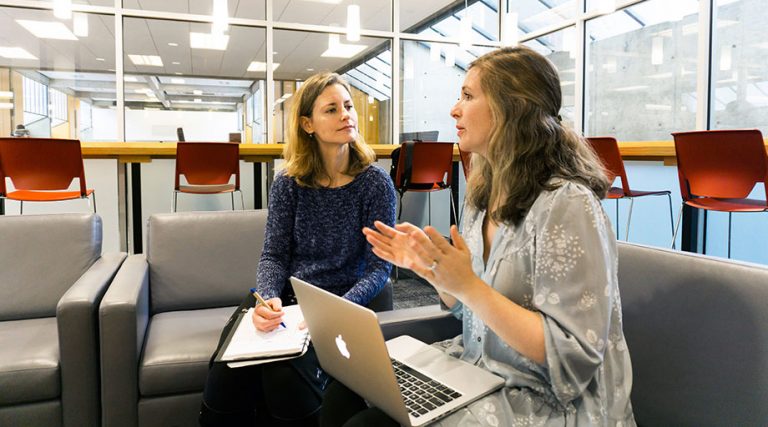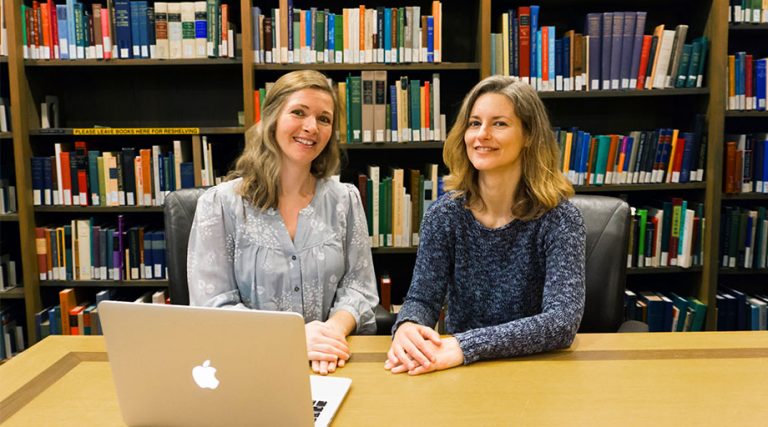
Librarian Ursula Ellis and researcher Kirsten Marchand.
UBC librarians are expert searchers, organizers and analyzers — and this unique set of skills is making them indispensable to medical research at UBC.
In the spring of 2018, The Canadian Institute of Health Research funded twenty-two grants through the Opioid Crisis Knowledge Synthesis Operating grant. This $1.85 million dollar grant aimed to address the pressing evidence needs of knowledge users within the context of the Canadian Drugs and Substances Strategy and help tackle the most urgent elements of the opioid crisis, including opioid-related mortality rates.
Librarians make grant applications more successful
UBC researchers received six of the twenty-two grants awarded nationally. Of those, five received some kind of librarian support. “The literature tells us that librarians’ involvement makes grant applications more successful, particularly in the area of systematic reviews,” says Aleteia Greenwood, Head of Woodward Library. “It is gratifying to see that this held true in this particular competition.”
A systematic review, and similar review types such as scoping reviews, provide a complete, exhaustive summary of current evidence relevant to a research question. Systematic reviews help researchers identify inconsistencies and gaps in diverse evidence to define future research needs. Surfacing the relevant literature can be a challenge and it is in this area that librarians are able to make a significant impact.
Researcher Kirsten Marchand consulted the expertise of librarian Ursula Ellis to conduct a scoping review exploring how principles of patient-centered care can be applied to the treatment of people with opioid use disorder as a complement to pharmacological treatment. “Our team of health care providers, advocates and researchers was already doing work in this area of patient-centered care, but we had never done a systematic review on the topic,” she says, “Ursula was extremely helpful to us at the proposal stage, walking us through the mechanics of building a search strategy to demonstrate feasibility. She was instrumental in the refining and framing of our research question and identifying key search terms.” Once the project was funded, Ellis continued to provide support on the project, helping to tweak and refine the search strategy. “We are so immensely grateful to Ursula,” says Marchand, “I feel that her work with me went beyond providing education and support, she was really making scientific contributions in helping to think through our study design and research question.”

Dr. Jan Klimas and his team at the BC Centre for Substance Use turned to librarian Dean Giustini for his expertise in search strategy when putting together a systematic review looking at patient characteristics that are predictive of whether someone will go into prescription opioid addiction when they are prescribed opioids for pain for the first time. “Dean’s contributions were essential in moving our project forward,” he says, “He helped us refine which search terms would best pick up studies about predictive factors. This is a very tricky thing – these are not clinical trials. The types of studies we were looking for are not well-indexed and can be difficult to surface.”
UBC librarians offer customized workshops and training for researchers
When putting together a realist review that explores how online solutions might help improve the system of care and decrease opioid-related mortality, Dr. Mohammadali Nikoo on behalf of Addictions and Concurrent Disorders (ACD) Research Group led by Michael Krausz reached out to librarians Helen Brown and Vanessa Kitchin for support. “Helen helped us in the proposal stage in creating a search strategy and once the project was underway, Vanessa demonstrated a mock literature review for our team, helping us get an idea of what we needed to do. She’s been available for consultation throughout the project— it has been a very positive experience for us.”
“UBC librarians are helping to surface knowledge that might remain hidden or require significant resources on the part of the researcher,” says Lea Starr, UBC Associate University Librarian in charge of Research. “This allows researchers to demonstrate that the research undertaken will have an impact, and will directly correspond to the need.”
As for future research, Marchand, Klimas and Nikoo all consider librarian consultation an integral part of the research lifecycle and plan to build librarian consultation into future research. “In this new era of fast-paced information that is emerging, I think the librarian’s role is becoming more and more important,” says Nikoo, “We are looking forward to more collaboration in the future.”
To arrange for a systematic review consultation, please complete this form and send it to your subject librarian.
Attend one of UBC Library’s monthly Systematic Review workshops.